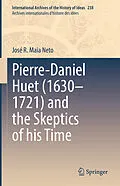This book offers a detailed and scholarly historical and philosophical examination of French scepticism from Descartes to the beginning of the Enlightenment by examining the views of Pierre-Daniel Huet (1630-1721). It shows the crucial role played by Huet in the modification of the early modern sceptical tradition: from a practical perspective closer to ancient scepticism, mostly presented by Montaigne and Charron, to an epistemological and metaphysical perspective strongly influenced by Descartes's doubt. The book examines and gives original interpretations of the various sceptical (and semi-sceptical) views held in the period and their connections to Huet's own scepticism. Besides known philosophers such as Descartes, Gassendi, Pascal and Bayle, the book also accesses sceptical views held by secondary figures such as La Mothe Le Vayer and Simon Foucher and others who have not thus far been connected to the sceptical tradition such as Jean-Baptiste du Hamel and Madeleine de Scudéry. The book is useful for scholars in the field of early modern ideas: philosophical, religious and scientific.
Autorentext
José R. Maia Neto is an expert on the history of modern scepticism who teaches at the Universidade Federal de Minas Gerais, Belo Horizonte, Brazil. His areas of interest also include early modern history of ideas (philosophical, scientific and religious), Socrates and ancient scepticism, philosophy and literature, and the Brazilian Nineteenth century writer Machado de Assis. He is the author of Machado de Assis, the Brazilian Pyrrhonian (Purdue U. P, 1994), The Christianization of Pyrrhonism (Kluwer, 1995) and Academic Skepticism in Seventeenth-Century French Philosophy (Springer, 2014). With Richard Popkin, he co-edited Skepticism in Renaissance and Post-Renaissance Thought (Humanity Books, 2004) and Skepticism, an Anthology (Prometheus Books, 2007); with Gianni Paganini he co-edited Renaissance Scepticisms (Springer, 2009), and with G. Paganini and John Laursen, Skepticism in the Modern Age (Brill, 2009).
Inhalt
Chapter 1 Introduction
Chapter 2 Erudite libertines
2.1 Pintard's Libertinage Érudit and Huet's place in the movement.
2.2 A man of letters: Hellenist and Biblical scholar, translator, poet, literary theorist, novelist, and character
2.3 Pierre Gassendi (1592-1655)
2.4 François de La Mothe Le Vayer (1588-1672)
2.5 Montaigne and Charron
Bibliography
Chapter 3 Traité philosophique de la faiblesse de l'esprit humain: first book of Huet's planned Alnetanae Quaestiones in five books 3.1 Huet's philosophical project3.2 The originally planned Alnetanae Quaestiones
3.3 Huet's fictional interlocutors in planned AQ
3.3.1 Gautruche: original interlocutor of books III-V of planned AQ (books I-III of published AQ)
3.3.2 Le Valois: original interlocutor of book II of planned AQ (published Censura)3.3.3 Du Hamel: original interlocutor of book I of planned AQ (published Traité)
3.4 Synthesis of the major modifications in the Latin manuscripts
3.4.1 Major voluntary modifications
3.4.2 Major modifications to hide authorship
3.4.3 Major modifications to address criticisms
3.5 The history of the manuscripts of the Traité after seclusion from AQ3.6 Conclusions
BibliographyChapter 4 From Cartesian physics to Cartesian skepticism against Cartesian metaphysics
4.1 The relevance of Descartes in Huet's intellectual life
4.2 The first reception
4.3 Huet as a mitigated Cartesian natural philosopher
4.4 Descartes's attack on classic scholarship
4.5 Censura: a skeptical attack on Descartes's metaphysics
4.6 The reason-faith distinction
Bibliography
Chapter 5 French Skeptics in the second half of 17th century5.1 Blaise Pascal (1623-1662)
5.1.1 Origenis5.1.2 Demonstratio
5.1.3 Traité Philosophique and Concordia
5.2 Simon Foucher (1644-1696)
5.3 Pierre Bayle (1647-1706)
Bibliography
Chapter 6 Conclusion
Appendix - Chronological table of Huet's life, works (marked in bold) and selected personal philosophical library
